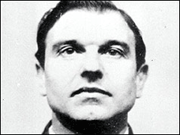 |
| George Blake's Soviet spymasters are thought to be behind the breakout |
| 1966: Double-agent breaks out of jail |
England have
One of Britain's most notorious double-agents, George Blake, has escaped from prison in a daring break-out believed to have been masterminded by the Soviet Union.
Wardens at Wormwood Scrubs prison last saw him at the evening roll call, at 1730 GMT.
An hour-and-a-half later, his cell was discovered to be empty.
After a short search, the escape route was found. Bars in a window at the end of a landing had been sawn away and a rope ladder hung down inside the prison wall.
Blake is believed to have taken advantage of the free association allowed between prisoners on Saturday afternoons in the long-term wing, where he had his cell.
He had served a little over five years of his 42-year sentence.
He was not under high security at the prison, and the privileges he enjoyed have been heavily criticised in the wake of his escape.
He was removed from the list of likely escapers after only a year, and wardens were said to have been lulled into a false sense of security by his seeming acceptance of his exceptionally long sentence.
Blake was charged under the Official Secrets Act in May 1961. During his trial, part of which was held in camera, he pleaded guilty to five counts of passing on secrets to the Soviet authorities.
He was sentenced to the maximum of 14 years on each of three counts, to run consecutively - a total of 42 years. It was the longest jail term any British court had handed down to an individual to date.
He spent nine years as a double-agent after being converted to Communism while a prisoner of war in Seoul, during the Korean War.
During this time, he is believed to have betrayed the names of more than 40 British agents to the Soviets. Many disappeared, and were thought to have been executed.
His actions devastated British secret service operations in the Middle East. He is believed to have passed on the names of almost every British agent working in Cairo, Damascus and Beirut.
Lord Parker, Lord Chief Justice, the judge sentencing him, likened his actions to treason, and said, "It is one of the worst that can be envisaged other than in a time of war."
|